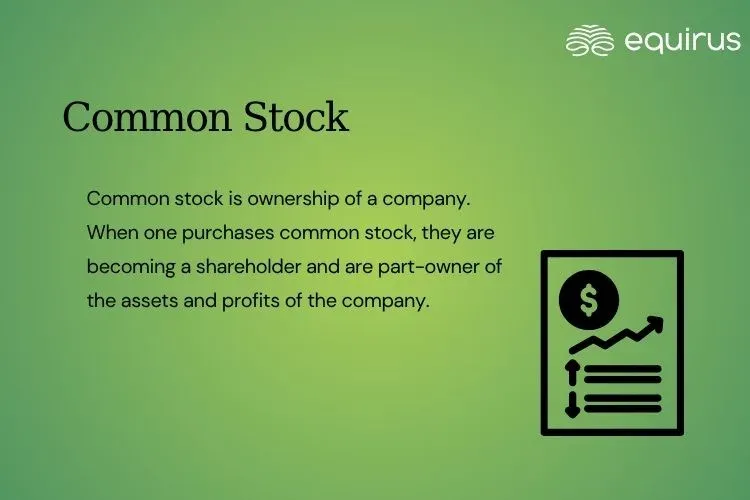Common Stock

Key Highlights
-
Common stock is ownership of a company.
-
When one purchases common stock, they are becoming a shareholder and are part-owner of the assets and profits of the company.
What is Common Stock?
Common stock is ownership of a company. When one purchases common stock, they are becoming a shareholder and are part-owner of the assets and profits of the company.
It is the most fundamental type of equity ownership and what most people mean when they say "stocks."
Key Features of Common Stock
1. Voting Rights
-
Common stockholders usually do enjoy voting rights on major corporate issues like the election of the board of directors or mergers.
-
Voting can be a one-share-per-vote system.
2. Dividends (Not Guaranteed)
- Dividends can be paid to common stockholders, but they are not required and are subject to the profitability of the corporation and at the discretion of the board.
3. Capital Appreciation
- Shareholders stand a possibility to gain if the company does well and the stock price appreciates over time.
4. Last in Line in Event of Liquidation
-
In the event that the company closes down or is bankrupt, the common stockholders are settled last after debt and preferred shareholders.
-
This makes the common stock riskier compared to bond or preferred stock.
Reasons Why Companies Issue Common Stock
-
To raise money to expand, retire debt, or for operations.
-
Issuing of shares provides companies with a way to create capital without accessing money through lending.
-
Issuance of an IPO (Initial Public Offering) enables companies to sell common stock to the general public for the very first time.
Benefits to Investors
1. Control and Ownership: Shareholders earn the right to vote on issues within a business.
2. Long-Term Return: Potential of appreciation of capital should the company become successful.
3. Liquidity: Common stock typically is traded in the stock market and can be sold or purchased with ease.
Risk to Investors
1. Price Volatility: Prices may fluctuate wildly.
2. Unpredictability of Dividend: No assurance of periodic income.
3. Capital Loss: If the business collapses or does not perform well, the investors can lose their capital.
Example
-
If you purchase 100 units of Tata Motors common stock:
-
You now hold a minute stake in the business.
-
You have the right to vote in shareholder meetings.
-
If the price of the share goes up, your investment is worth more.
-
If Tata Motors pays dividends, you can get a share.
But if the company is not in financially good shape, the value of the stock price can go down.
Common Stock vs Preferred Stock
| Feature | Common Stock | Preferred Stock |
|---|---|---|
| Ownership | Yes | Yes |
| Voting Rights | Usually yes | Usually no |
| Dividends | Variable, not guaranteed | Fixed, usually guaranteed |
| Priority in Liquidation | Lower than preferred | Higher than common |
| Risk | Higher | Lower |
| Growth Potential | Higher (due to capital gains) | Lower (stable returns) |
